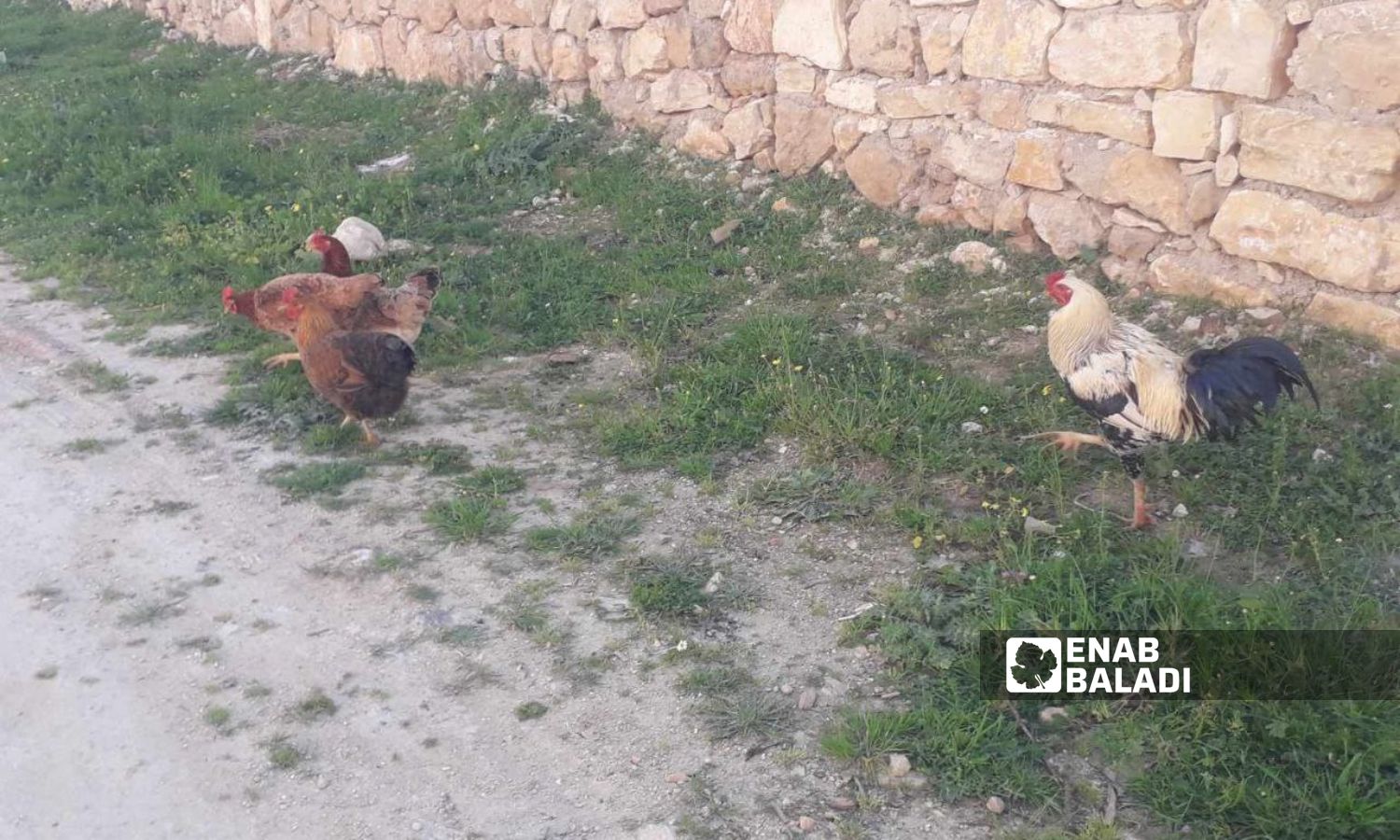



Latakia – Linda Ali
Chicken breeding in Latakia province is no longer confined to benefiting from its products, such as eggs and meat, amidst the high prices of both items reaching unprecedented figures in the markets. There are now several types of chickens being bred either for decorative purposes or for cockfighting.
Ali, a 28-year-old government employee, started breeding chickens for commerce about two years ago. He says there are several new breeds in Syria, such as “Fayoumi” and “Brahma”, in addition to fighting roosters, “Austrian”, “local”, and many others.
The young man, who makes a good profit, said that the price of a chicken depends on its type. There is “Fayoumi”, where a pair of hens with a rooster ranges between 500,000 and 2.5 million Syrian pounds, and “Brahma” can reach up to three million pounds, depending on the weight of the rooster and the hens. The roosters used in betting can fetch from one million up to 12 million pounds (one US dollar equals 13,850 pounds).
The chicken’s egg production is a primary factor for its high price. The “Fayoumi” breeds up to 300 eggs a year, which is why the price of each egg during the hatching season in April rises to between 5,000 and 20,000 pounds, and during ordinary days, it costs the same as any other local egg, about 3,000 pounds.
Ali added that the high price of “Brahma” chickens and their eggs is due to them being a decorative breed. Owners of villas and large farms buy them for decoration, like peacocks. Their market is limited to some areas in Damascus, especially in Yaafour.
The roosters used in cockfighting have the most well-known market, the young man mentioned, noting the existence of two arenas in Latakia; the first in al-Bassa and the second in Jableh, where owners of the dueling roosters attend, and the competition begins through live broadcasts in one of the private groups, attended by people from the Gulf and Iraq, with Syrian delegates at the race track placing bets on them. Some might pay substantial amounts for the victorious rooster.
Syrian Penal Code prohibits gambling and punishes it, thereby betting since it is considered a form of gambling, which the Syrian law classifies as a crime committed by dangerous people due to their life habits.
The law does not explicitly mention betting, but it is considered a form of gambling. Its definition in the law appears in article “618” of the penal code, referring to gambling games where luck prevails over skill or cunning. The law mentioned “roulette”, “baccarat”, and “poker”, among others, as forms of gambling.
Gambling is not a crime unless it occurs in one of the public places, made available to the public, or in a private house intentionally used for this purpose.
Rural families are used to raising chickens to benefit from their eggs, the most famous types being “Austrian” and “local”. Breeding has increased due to the high price of eggs. For instance, having 20 laying hens could guarantee a daily income estimated at 60,000 Syrian pounds, understanding that chickens are not very expensive unless sick, and they usually feed off nature or leftover foods.
Samiha, 59 years old, living in one of the villages belonging to the al-Qatariyah region in Latakia’s countryside, said she had been keen on increasing the number of chickens she owned since 2023. She now has around 22 laying hens, which she considers her primary source of income, besides the small land she owns, where she also grows some leafy vegetables for sale.
Chicken breeding has recently spread in the same city, where some families take advantage of their proximity to gardens and raise chickens in them, as is the case in al-Ramel al-Shamali neighborhood and Damsarkho, as well as suburbs such as Bisnada and Sqoubin.
This year, breeders were not so fortunate due to the spread of the poultry plague or “Newcastle disease”, causing the death of large numbers of chickens throughout the countryside.
The plague cost Bassam, a 45-year-old farmer working on a farm belonging to al-Bahluliyeh village, 10 chickens and a “Brahma” rooster worth more than four million pounds. No purchased medicine was effective for treatment.
Bassam said that a veterinarian advised a vaccine for his chickens every four months, adding that a single dose costs 20,000 pounds for the locally manufactured type and 85,000 for the foreign type; a single dose is sufficient for a thousand chickens. He recently purchased the locally manufactured type, hoping the rest of his chickens would survive the plague.
A veterinarian, who preferred not to disclose her name, said that the chickens’ resistance to the Newcastle disease links to the strength of their immunity. She added that the widespread outbreak of the disease is due to many breeders’ ignorance of treatment methods, compounded by the lack of an educational role for guidance units, which if functioning properly, would have prevented the chickens’ death.
The veterinarian advises breeders to confine the chickens to their designated space and not allow them to go out, especially if there is any sick poultry in the vicinity, to ensure that the infection does not spread. It is also important to vaccinate regularly, which is inexpensive and can save breeders from financial losses.
if you think the article contain wrong information or you have additional details Send Correction